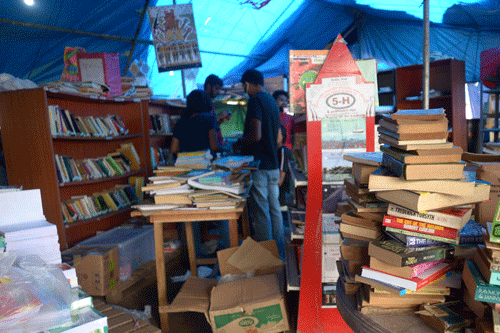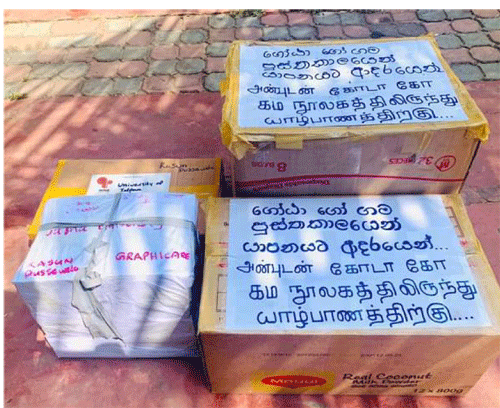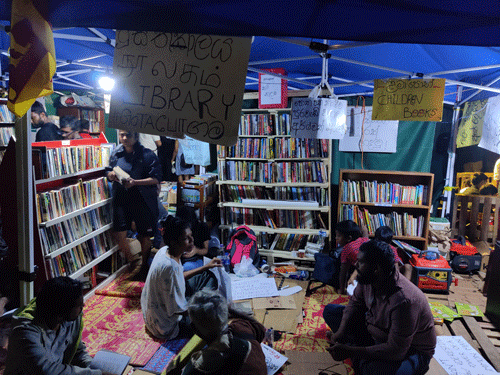Protest site library opens new chapter in Sri Lanka

Overflowing with books: The library today. Pic by Eshan Fernando
The library at ‘Gotagogama’ began with a Facebook post, 20 books and a few likeminded friends amidst the gradual swelling of protests in Sri Lanka two months ago. A call on social media asking protestors to bring books when they came to Galle Face resulted in some donations. Soon, more books trickled in. And then the books kept coming and coming.
By its volunteers’ estimates, the ‘Gotagogama’ library has seen a number upwards of 5,000 books change hands through the space in the past two months. All books are stamped with a trilingual library seal inside and the hashtag #GoHomeGota written on the covers. Some of the book donations have wishes for the protestors written in them. Book genres are diverse: a biography of Mahinda Rajapaksa written in Tamil amicably shares shelf space with a battered Mills & Boon, J. Krishnamurti, Elena Ferrante and a collection of Sinhala short stories.
“We believe that books are meant to travel among people. A book’s value lies and increases in the way it is read and circulated by people. A book in a cupboard has no value. This is an open space. There are no rules. Anyone can bring a book, anyone can take a book. We haven’t put any conditions on borrowing,” says Neelanuwan, who is from Tangalle and was a part of the original group who started the library.
Now in its second month, ‘Gotagogama’ – a makeshift city set up by protesters close to the Presidential Secretariat calling for the resignation of the President – has a cinema, medical tents, kitchen, centralised logistics, a school, an art gallery, a legal aid tent, an IT centre and more. The protest space has changed over the weeks, ebbing and flowing according to political developments and the ongoing economic crisis and was also marked by the violence on May 9. The architecture of the protest space has undergone transformations since its inception, as has the library.

A spirit of sharing: Donation to Jaffna library. Pic courtesy ‘Gotagogama’ library
In its early iterations, the library occupied a 10 x 10 foot space – a sparse tent, a few bookcases, some mats and flattened cardboard boxes laid out on wooden pallets for people to sit. The library has expanded, grown with the generosity of people who have donated book cupboards, stationery and trilingual books. Today, the library occupies a space four times its original size and its book donations haven’t been able to keep up with its storage and display – books remain piled in corners and on tables, waiting to be sorted.
As you read about it now, the space will have changed again – the library is to be moved from its location to another tent within the protest site with a canopy which offers better defence from the rain. A key challenge has been protecting the books from the rains over the past weeks. Often, a logistical triage takes place to safeguard the books whenever heavy rains lash over the grounds: volunteers rush to plug leaks, care is taken to ensure that the water on the taupe doesn’t collect and the books are rapidly covered. “We protect the books like we protect children,” smiles Fazmy wryly.
Fazmy, who was also a part of the inaugural group which started the library and comes from Mawanella, notes how the library has become a strand of the daily life around the area. People come by solely to drop off the day’s newspapers, elderly people come to read the papers every morning. In a corner, as we speak, three girls remain engrossed in a board game and a monk comes by to inquire about eye donation forms. In another corner, dozens of phones are charged – the library functions as a charging station for those who occupy the site and also distributes stationery as needed. Recently, ‘Gotagogama’ has been receiving post (everything ranging from praise to people sharing their problems to criticism of the protest) and the library functions as a receptacle for the protest site’s mail. A Facebook Page (Gotagogama Library) provides updates about the library’s recent activities.

Early days: The library in its initial stages.Pic by Adilah Ismail
“The outpouring of support from people has been staggering. Words cannot encompass the support that we have received. A lot of people come to show their appreciation and it’s a huge source of strength,” reflects Fazmy. He cites a family from Balangoda as an example – they had very little but had put together enough money to make the journey to visit the protest site in Colombo and donate some books and show their support for the protestors.
The library operates on an honour system. Both Fazmy and Neelanuwan were shaped by the local libraries that were a part of their lives and speak about the bureaucratic red tape required to obtain memberships and how old processes are often disconnected from new realities. For instance, the time taken to read a book amidst work responsibilities, or municipal limitations which don’t take into account internal economic migration within the country. The emphasis placed on obtaining guarantors within geographical limits and the slow process of obtaining membership in local libraries often act as a deterrent, they explain.
“You have to go through a big process to borrow books. I don’t think the next generation will go through so much effort to read a book. They are depriving people of a chance to learn, they are depriving the country of a public that reads,” notes Neelanuwan
The ‘Gotagogama’ library has also begun donating books to set up libraries in other protest spaces around Sri Lanka and for underprivileged libraries in need of books. Recently, books were donated to begin a temple library near Hambantota for children from a nearby farming community who had to contend with frequent wild elephant attacks. Books were also shared with the Jaffna Library as a gesture to remember the 1981 burning of the Jaffna Library.
The ‘Gotagogama’ library follows a tradition of libraries at protest sites and the emphasis placed on public learning in citizen-led resistance. Recently in India, libraries were a fixture in the farmers’ protests and at the Shaheen Bagh protest in Delhi. People’s libraries were also a part of the Gezi Park protests in Turkey, Hong Kong’s Umbrella Movement, the Occupy Wall Street movements in the US and the protests in Cairo’s Tahrir Square in Egypt.
A lot has already been written about ‘Gotagogama’. Perhaps what the protest space ultimately offers is a public space for reimagining. The library is a microcosm of this ambitious thought-transfiguration and offers an inchoate picture of what inclusive public learning and knowledge sharing can look like without traditional gate keepers, without class or economic privileges to ease the process.
“When we start talking about democracies, we need to talk about knowledge. A library should be an open space. Even if people steal a book to sell it, that’s ok. Books have lives. They will finally reside with someone who loves them,” says Neelanuwan. “If libraries work to create open spaces like this, I think reading publics will grow, a knowledgeable generation will grow.”
Searching for an ideal partner? Find your soul mate on Hitad.lk, Sri Lanka's favourite marriage proposals page. With Hitad.lk matrimonial advertisements you have access to thousands of ads from potential suitors who are looking for someone just like you.


